-
 bitcoin
bitcoin $87959.907984 USD
1.34% -
 ethereum
ethereum $2920.497338 USD
3.04% -
 tether
tether $0.999775 USD
0.00% -
 xrp
xrp $2.237324 USD
8.12% -
 bnb
bnb $860.243768 USD
0.90% -
 solana
solana $138.089498 USD
5.43% -
 usd-coin
usd-coin $0.999807 USD
0.01% -
 tron
tron $0.272801 USD
-1.53% -
 dogecoin
dogecoin $0.150904 USD
2.96% -
 cardano
cardano $0.421635 USD
1.97% -
 hyperliquid
hyperliquid $32.152445 USD
2.23% -
 bitcoin-cash
bitcoin-cash $533.301069 USD
-1.94% -
 chainlink
chainlink $12.953417 USD
2.68% -
 unus-sed-leo
unus-sed-leo $9.535951 USD
0.73% -
 zcash
zcash $521.483386 USD
-2.87%
What is the consensus mechanism of SHIB coins? What is the difference with PoW/PoS?
SHIB coins leverage Ethereum's PoS for energy-efficient transactions, but SHIB holders can't stake for rewards, relying on Ethereum's validators.
May 12, 2025 at 03:36 am
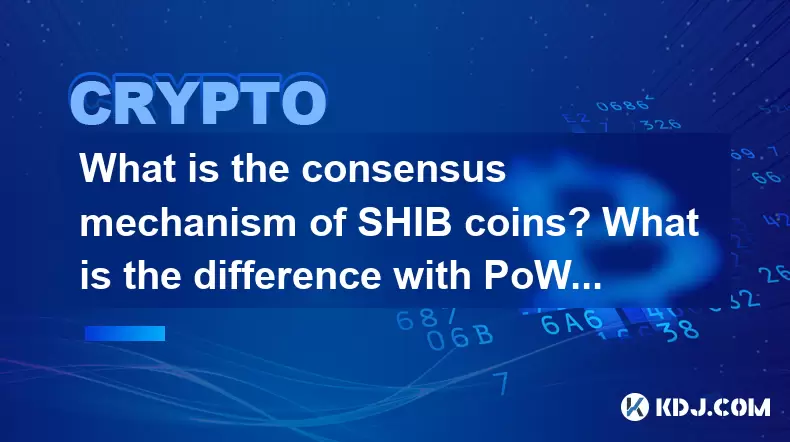
Shiba Inu (SHIB) coins operate on a unique consensus mechanism that sets them apart from traditional Proof of Work (PoW) and Proof of Stake (PoS) systems. Understanding this mechanism is crucial for anyone interested in the intricacies of SHIB and how it functions within the broader cryptocurrency ecosystem.
The Consensus Mechanism of SHIB Coins
SHIB coins utilize the Ethereum blockchain, which means they inherit the consensus mechanism of Ethereum. At the time of SHIB's inception, Ethereum used a Proof of Work (PoW) consensus mechanism. However, Ethereum has since transitioned to a Proof of Stake (PoS) system with the Ethereum 2.0 upgrade. This transition directly impacts how SHIB operates, as it now functions on a PoS consensus mechanism.
The key aspect of SHIB's consensus mechanism is that it does not have its own blockchain but instead leverages Ethereum's infrastructure. This means that SHIB transactions are validated and added to the blockchain through Ethereum's network of validators. In a PoS system, validators are chosen to create new blocks based on the number of coins they hold and are willing to 'stake' as collateral.
How SHIB's Consensus Mechanism Works
In the PoS system, validators lock up a certain amount of their Ether (ETH) to become eligible to validate transactions and create new blocks. The more ETH a validator stakes, the higher their chances of being chosen to validate a block. This process is more energy-efficient than PoW, as it does not require the intensive computational work needed to solve complex mathematical problems.
For SHIB, this means that when a user initiates a transaction, it is processed by Ethereum's validators. These validators then add the transaction to a block, which is subsequently added to the Ethereum blockchain. The consensus mechanism ensures that the network agrees on the state of the ledger, preventing double-spending and maintaining the integrity of the blockchain.
Differences Between SHIB's Consensus Mechanism and PoW
Proof of Work (PoW) is the original consensus mechanism used by Bitcoin and many other cryptocurrencies. In PoW, miners compete to solve complex mathematical puzzles, and the first to solve the puzzle gets to add a new block to the blockchain and is rewarded with cryptocurrency. This process requires significant computational power and energy, leading to concerns about its environmental impact.
In contrast, SHIB, through Ethereum's PoS, does not require miners to solve puzzles. Instead, validators are chosen based on their stake in the network. This shift from PoW to PoS for SHIB means that the process of adding new blocks is less energy-intensive and more scalable. Additionally, PoS is less vulnerable to 51% attacks, as an attacker would need to control a majority of the staked coins, which is more difficult and costly than controlling a majority of the network's computational power.
Differences Between SHIB's Consensus Mechanism and PoS
While SHIB operates on Ethereum's PoS system, it is important to note that SHIB itself does not have staking capabilities. This means that SHIB holders cannot directly participate in the validation process or earn rewards for staking their SHIB. Instead, they rely on Ethereum's validators to process their transactions.
Another key difference is that SHIB's consensus mechanism is indirectly influenced by Ethereum's governance and upgrades. Any changes to Ethereum's consensus mechanism, such as further improvements to PoS, directly affect how SHIB transactions are processed. This reliance on Ethereum's infrastructure means that SHIB's consensus mechanism is somewhat passive, as it does not have its own independent validation process.
Implications for SHIB Users
For users of SHIB, the consensus mechanism has several implications. Firstly, the transition to PoS has made transactions faster and more cost-effective. Ethereum's PoS system aims to reduce gas fees and increase transaction throughput, which benefits SHIB users. Secondly, the environmental impact of SHIB transactions is reduced, aligning with the growing trend towards more sustainable cryptocurrency solutions.
However, the reliance on Ethereum's infrastructure also means that SHIB users are subject to Ethereum's network congestion and fees. During periods of high demand, SHIB transactions may experience delays and higher costs. Additionally, SHIB users do not have the opportunity to participate in staking and earn rewards, which is a significant feature of many PoS-based cryptocurrencies.
Frequently Asked Questions
Q1: Can SHIB holders stake their coins to earn rewards?No, SHIB holders cannot stake their coins to earn rewards. SHIB operates on Ethereum's PoS system, but it does not have its own staking mechanism. SHIB transactions are processed by Ethereum validators, who are chosen based on their staked ETH.
Q2: How does the transition from PoW to PoS affect SHIB transactions?The transition from PoW to PoS has made SHIB transactions more energy-efficient and potentially faster and cheaper. Ethereum's PoS system aims to reduce gas fees and increase transaction throughput, which benefits SHIB users. However, SHIB transactions are still subject to Ethereum's network conditions, which can lead to delays and higher costs during periods of high demand.
Q3: Is SHIB's consensus mechanism more secure than PoW?SHIB's consensus mechanism, which is based on Ethereum's PoS, is considered more secure than PoW in certain aspects. PoS is less vulnerable to 51% attacks because an attacker would need to control a majority of the staked coins, which is more difficult and costly than controlling a majority of the network's computational power. However, SHIB's security is indirectly tied to Ethereum's, so any vulnerabilities in Ethereum's system could potentially affect SHIB.
Q4: How does SHIB's reliance on Ethereum's infrastructure impact its scalability?SHIB's reliance on Ethereum's infrastructure means that its scalability is directly tied to Ethereum's. Ethereum's transition to PoS aims to improve scalability by increasing transaction throughput and reducing gas fees. However, during periods of high demand, Ethereum's network can still experience congestion, which can impact the speed and cost of SHIB transactions.
Disclaimer:info@kdj.com
The information provided is not trading advice. kdj.com does not assume any responsibility for any investments made based on the information provided in this article. Cryptocurrencies are highly volatile and it is highly recommended that you invest with caution after thorough research!
If you believe that the content used on this website infringes your copyright, please contact us immediately (info@kdj.com) and we will delete it promptly.
- Bitcoin Faces Identity Crisis as Speculators Flock to Prediction Markets and Ultra-Short Options
- 2026-02-02 00:30:06
- MGK and Jelly Roll Honor Ozzy Osbourne at Pre-Grammy Gala, Sparking Fan Frenzy
- 2026-02-02 00:50:02
- Super Bowl Coin Flip: Unpacking the Prediction Power of Heads or Tails
- 2026-02-02 01:30:01
- Litecoin Price Cracks 9-Year Floor Amidst Market Breakdown: What's Next for the OG Crypto?
- 2026-02-02 01:20:02
- Crypto News, Cryptocurrency Markets, Latest Updates: A Topsy-Turvy Start to 2026
- 2026-02-02 01:15:01
- New York Minute: LivLive Presale Ignites, While Solana Navigates Choppy Waters
- 2026-02-02 01:15:01
Related knowledge
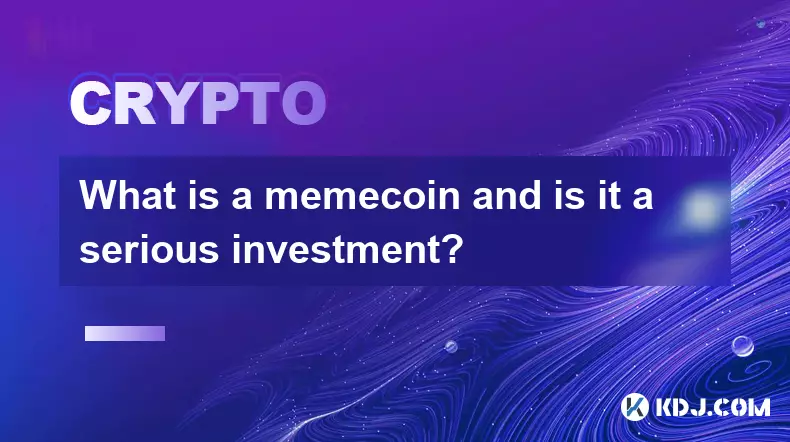
What is a memecoin and is it a serious investment?
Nov 30,2025 at 01:20am
Understanding the Nature of Memecoins1. Memecoins are digital assets inspired by internet jokes, viral trends, or pop culture references rather than t...
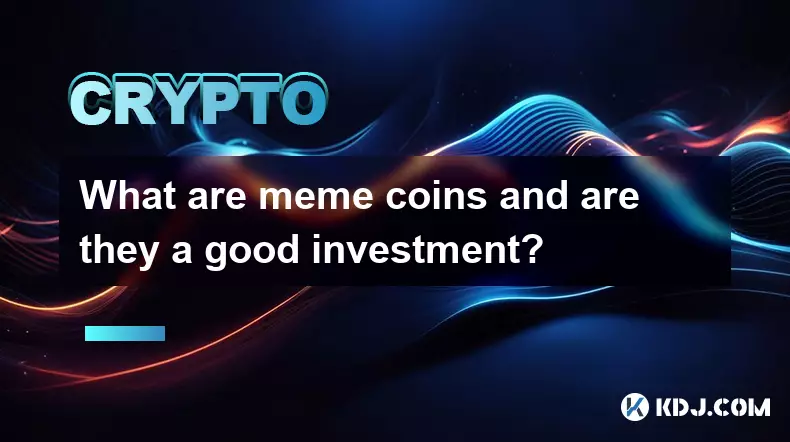
What are meme coins and are they a good investment?
Oct 16,2025 at 03:54pm
What Are Meme Coins?1. Meme coins are digital currencies inspired by internet jokes, viral trends, or social media culture. They often originate as pa...

What is the relationship between "Shiba Inu" and "Dogecoin"?
Sep 19,2025 at 08:36pm
Origins and Inspiration Behind Shiba Inu and Dogecoin1. Dogecoin was created in 2013 by software engineers Billy Markus and Jackson Palmer as a lighth...
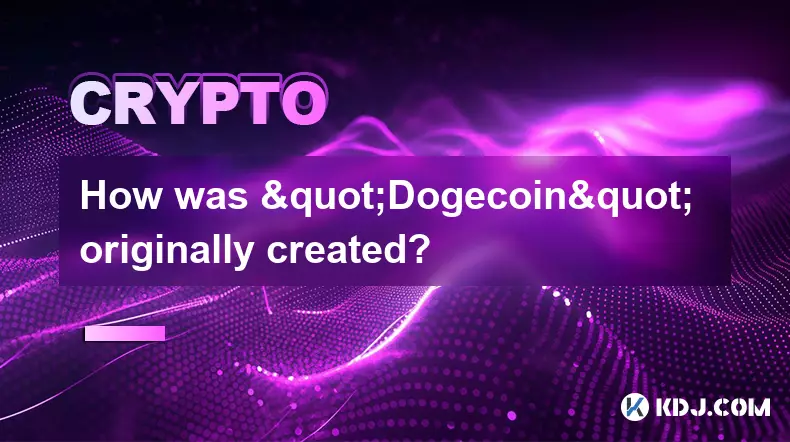
How was "Bitcoincoin" originally created?
Sep 17,2025 at 07:18pm
Origins of Dogecoin in the Cryptocurrency Landscape1. Dogecoin was introduced to the digital currency world in December 2013 by software engineers Bil...
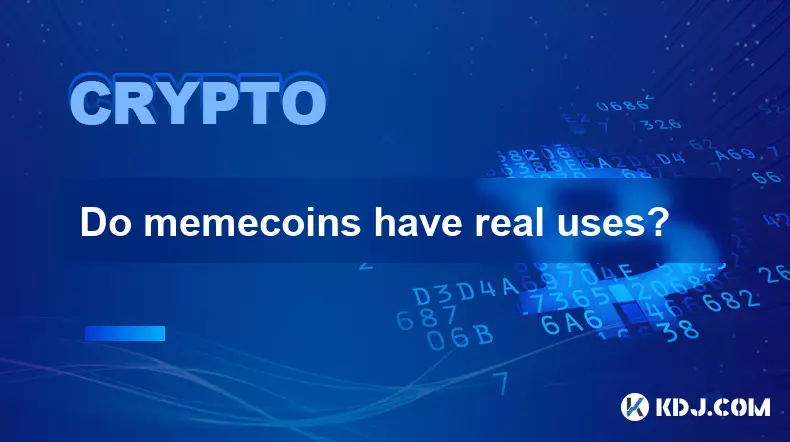
Do memecoins have real uses?
Sep 19,2025 at 03:54am
Understanding the Role of Memecoins in the Crypto Ecosystem1. Memecoins originated as internet joke currencies, often inspired by viral memes or pop c...
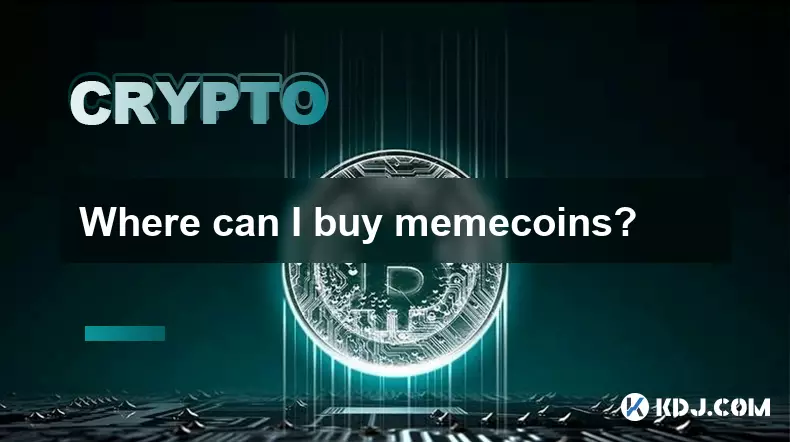
Where can I buy memecoins?
Sep 18,2025 at 02:18pm
Popular Platforms for Acquiring Memecoins1. Centralized exchanges like Binance, OKX, and Bybit have become primary destinations for traders seeking ne...

What is a memecoin and is it a serious investment?
Nov 30,2025 at 01:20am
Understanding the Nature of Memecoins1. Memecoins are digital assets inspired by internet jokes, viral trends, or pop culture references rather than t...

What are meme coins and are they a good investment?
Oct 16,2025 at 03:54pm
What Are Meme Coins?1. Meme coins are digital currencies inspired by internet jokes, viral trends, or social media culture. They often originate as pa...

What is the relationship between "Shiba Inu" and "Dogecoin"?
Sep 19,2025 at 08:36pm
Origins and Inspiration Behind Shiba Inu and Dogecoin1. Dogecoin was created in 2013 by software engineers Billy Markus and Jackson Palmer as a lighth...

How was "Bitcoincoin" originally created?
Sep 17,2025 at 07:18pm
Origins of Dogecoin in the Cryptocurrency Landscape1. Dogecoin was introduced to the digital currency world in December 2013 by software engineers Bil...

Do memecoins have real uses?
Sep 19,2025 at 03:54am
Understanding the Role of Memecoins in the Crypto Ecosystem1. Memecoins originated as internet joke currencies, often inspired by viral memes or pop c...

Where can I buy memecoins?
Sep 18,2025 at 02:18pm
Popular Platforms for Acquiring Memecoins1. Centralized exchanges like Binance, OKX, and Bybit have become primary destinations for traders seeking ne...
See all articles










































































